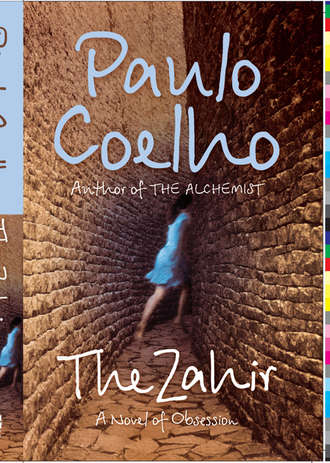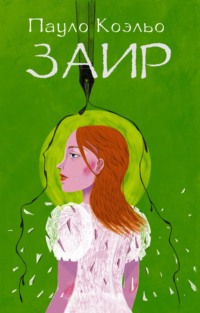
Полная версия
The Zahir: A Novel of Obsession
I am no longer someone dreaming of becoming something: I am. I am the shepherd crossing the desert, but where is the alchemist who helps him to carry on? When I finish this novel, I don’t entirely understand what I have written: it is like a fairy tale for grown-ups, and grown-ups are more interested in war, sex, or stories about power. Nevertheless, the publisher accepts it, the book is published, and my readers once again take it into the bestseller lists.
Three years later, my marriage is in excellent shape; I am doing what I always wanted to do; the first translation appears, then the second, and success – slowly but surely – takes my work to the four corners of the earth.
I decide to move to Paris because of its cafés, its writers and its cultural life. I discover that none of this exists any more: the cafés are full of tourists and photographs of the people who made those places famous. Most of the writers there are more concerned with style than content; they strive to be original, but succeed only in being dull. They are locked in their own little world, and I learn an interesting French expression: renvoyer l’ascenseur, meaning literally ‘to send the lift back up’, but used metaphorically to mean ‘to return a favour’. In practice, this means that I say nice things about your book, you say nice things about mine, and thus we create a whole new cultural life, a revolution, an apparently new philosophy; we suffer because no one understands us, but then that’s what happened with all the geniuses of the past: being misunderstood by one’s contemporaries is surely just part and parcel of being a great artist.
‘They send the lift back up’, and, at first, such writers have some success: people don’t want to run the risk of openly criticising something they don’t understand, but they soon realise they are being conned and stop believing what the critics say.
The Internet and its simple language are all that it takes to change the world. A parallel world emerges in Paris: new writers struggle to make their words and their souls understood. I join these new writers in cafés that no one has heard of, because neither the writers nor the cafés are as yet famous. I develop my style alone and I learn from a publisher all I need to know about mutual support.
‘What is this Favour Bank?’
‘You know. Everyone knows.’
‘Possibly, but I still haven’t quite grasped what you’re saying.’
‘It was an American writer who first mentioned it. It’s the most powerful bank in the world, and you’ll find it in every sphere of life.’
‘Yes, but I come from a country without a literary tradition. What favours could I do for anyone?’
‘That doesn’t matter in the least. Let me give you an example: I know that you’re an up-and-coming writer and that, one day, you’ll be very influential. I know this because, like you, I too was once ambitious, independent, honest. I no longer have the energy I once had, but I want to help you because I can’t or don’t want to grind to a halt just yet. I’m not dreaming about retirement, I’m still dreaming about the fascinating struggle that is life, power, and glory.
‘I start making deposits in your account – not cash deposits, you understand, but contacts. I introduce you to such and such a person, I arrange certain deals, as long as they’re legal. You know that you owe me something, but I never ask you for anything.’
‘And then one day…’
‘Exactly. One day, I’ll ask you for a favour and you could, of course, say “No”, but you’re conscious of being in my debt. You do what I ask, I continue to help you, and other people see that you’re a decent, loyal sort of person and so they too make deposits in your account – always in the form of contacts, because this world is made up of contacts and nothing else. They too will one day ask you for a favour, and you will respect and help the people who have helped you, and, in time, you’ll have spread your net worldwide, you’ll know everyone you need to know and your influence will keep on growing.’
‘I could refuse to do what you ask me to do.’
‘You could. The Favour Bank is a risky investment, just like any other bank. You refuse to grant the favour I asked you, in the belief that I helped you because you deserved to be helped, because you’re the best and everyone should automatically recognise your talent. Fine, I say thank you very much and ask someone else into whose account I’ve also made various deposits; but from then on, everyone knows, without me having to say a word, that you are not to be trusted.
‘You’ll grow only half as much as you could have grown, and certainly not as much as you would have liked to. At a certain point, your life will begin to decline, you got halfway, but not all the way, you are half-happy and half-sad, neither frustrated nor fulfilled. You’re neither cold nor hot, you’re lukewarm, and as an evangelist in some holy book says: “Lukewarm things are not pleasing to the palate.”’
The publisher places a lot of deposits – or contacts – into my account at the Favour Bank. I learn, I suffer, my books are translated into French, and, in the tradition of that country, the stranger is welcomed. Not only that, the stranger is an enormous success! Ten years on, I have a large apartment with a view over the Seine, I am loved by my readers and loathed by the critics (who adored me until I sold my first 100,000 copies, but, from that moment on, I ceased to be ‘a misunderstood genius’). I always repay promptly any deposits made and soon I too am a lender – of contacts. My influence grows. I learn to ask for favours and to do the favours others ask of me.
Esther gets permission to work as a journalist. Apart from the normal conflicts in any marriage, I am contented. I understand for the first time that all the frustrations I felt about previous love affairs and marriages had nothing to do with the women involved, but with my own bitterness. Esther, however, was the only woman who understood one very simple thing: in order to be able to find her, I first had to find myself. We have been together for eight years; I believe she is the love of my life, and although I do occasionally (or, to be honest, frequently) fall in love with other women who cross my path, I never consider the possibility of divorce. I never ask her if she knows about my extramarital affairs. She never makes any comment on the subject.
That is why I am astonished when, as we are leaving a cinema, she tells me that she has asked her magazine if she can file a report on a civil war in Africa.
‘What are you saying?’
‘That I want to be a war correspondent.’
‘You’re mad. You don’t need to do that. You’re already doing the work you want to do now. You earn good money – not that you need that money to live on. You have all the contacts you need in the Favour Bank. You have talent and you’ve earned your colleagues’ respect.’
‘All right then, let’s just say I need to be alone.’
‘Because of me?’
‘We’ve built our lives together. I love my man and he loves me, even though he’s not always the most faithful of husbands.’
‘You’ve never said anything about that before.’
‘Because it doesn’t matter to me. I mean, what is fidelity? The feeling that I possess a body and a soul that aren’t mine? Do you imagine I haven’t been to bed with other men during all these years we’ve been together?’
‘I don’t care and I don’t want to know.’
‘Well, neither do I.’
‘So, what’s all this about wanting to write about a war in some godforsaken part of the world?’
‘Like I said, I need to.’
‘Haven’t you got everything you need?’
‘I have everything a woman could want.’
‘What’s wrong with your life then?’ ‘Precisely that. I have everything, but I’m not happy. And I’m not the only one either; over the years, I’ve met and interviewed all kinds of people: the rich, the poor, the powerful, and those who just make do. I’ve seen the same infinite bitterness in everyone’s eyes, a sadness which people weren’t always prepared to acknowledge, but which, regardless of what they were telling me, was nevertheless there. Are you listening?’
‘Yes, I’m listening. I was just thinking. So, according to you, no one is happy?’
‘Some people appear to be happy, but they simply don’t give the matter much thought. Others make plans: I’m going to have a husband, a home, two children, a house in the country. As long as they’re busy doing that, they’re like bulls looking for the bullfighter: they react instinctively, they blunder on, with no idea where the target is. They get their car, sometimes they even get a Ferrari, and they think that’s the meaning of life, and they never question it. Yet their eyes betray the sadness that even they don’t know they carry in their soul. Are you happy?’
‘I don’t know.’
‘I don’t know if everyone is unhappy. I know they’re all busy: working overtime, worrying about their children, their husband, their career, their degree, what they’re going to do tomorrow, what they need to buy, what they need to have in order not to feel inferior, etc. Very few people actually say to me: “I’m unhappy.” Most say: “I’m fine, I’ve got everything I ever wanted.” Then I ask: “What makes you happy?” Answer: “I’ve got everything a person could possibly want – a family, a home, work, good health.” I ask again: “Have you ever stopped to wonder if that’s all there is to life?” Answer: “Yes, that’s all there is.” I insist: “So the meaning of life is work, family, children who will grow up and leave you, a wife or husband who will become more like a friend than a real lover. And, of course, one day your work will end too. What will you do when that happens?” Answer: there is no answer. They change the subject.’
‘No, what they say is: “When the children have grown up, when my husband – or my wife – has become more my friend than my passionate lover, when I retire, then I’ll have time to do what I always wanted to do: travel.” Question: “But didn’t you say you were happy now? Aren’t you already doing what you always wanted to do?” Then they say they’re very busy and change the subject.’
‘If I insist, they always do come up with something they’re lacking. The businessman hasn’t yet closed the deal he wanted, the housewife would like to have more independence and more money, the boy who’s in love is afraid of losing his girlfriend, the new graduate wonders if he chose his career or if it was chosen for him, the dentist wanted to be a singer, the singer wanted to be a politician, the politician wanted to be a writer, the writer wanted to be a farmer. And even when I did meet someone who was doing what he had chosen to do, that person’s soul was still in torment. He hadn’t found peace yet either. So I’ll ask you again: “Are you happy?”’
‘No. I have the woman I love, the career I always dreamed of having, the kind of freedom that is the envy of all my friends, the travel, the honours, the praise. But there’s something…’
‘What?’
‘I have the idea that, if I stopped, life would become meaningless.’
‘You can’t just relax, look at Paris, take my hand and say: I’ve got what I wanted, now let’s enjoy what life remains to us.’
‘I can look at Paris, take your hand, but I can’t say those words.’
‘I bet you everyone walking along this street now is feeling the same thing. The elegant woman who just passed us spends her days trying to hold back time, always checking the scales, because she thinks that is what love depends on. Look across the road: a couple with two children. They feel intensely happy when they’re out with their children, but, at the same time, their subconscious keeps them in a constant state of terror: they think of the job they might lose, the disease they might catch, the health insurance that might not come up with the goods, one of the children getting run over. And in trying to distract themselves, they try as well to find a way of getting free of those tragedies, of protecting themselves from the world.’
‘And the beggar on the corner?’
‘I don’t know about him. I’ve never spoken to a beggar. He’s certainly the picture of misery, but his eyes, like the eyes of any beggar, seem to be hiding something. His sadness is so obvious that I can’t quite believe in it.’
‘What’s missing?’
‘I haven’t a clue. I look at the celebrity magazines with everyone smiling and contented, but since I am myself married to a celebrity, I know that it isn’t quite like that: everyone is laughing and having fun at that moment, in that photo, but later that night, or in the morning, the story is always quite different. “What do I have to do in order to continue appearing in this magazine?” “How can I disguise the fact that I no longer have enough money to support my luxurious lifestyle?” “How can I best manipulate my luxurious lifestyle to make it seem even more luxurious than anyone else’s?” “The actress in the photo with me and with whom I’m smiling and celebrating could steal a part from me tomorrow!” “Am I better dressed than she is? Why are we smiling when we loathe each other?” “Why do we sell happiness to the readers of this magazine when we are profoundly unhappy ourselves, the slaves of fame.”’
‘We’re not the slaves of fame.’
‘Don’t get paranoid. I’m not talking about us.’
‘What do you think is going on, then?’
‘Years ago, I read a book that told an interesting story. Just suppose that Hitler had won the war, wiped out all the Jews and convinced his people that there really was such a thing as a master race. The history books start to be changed, and, a hundred years later, his successors manage to wipe out all the Indians. Three hundred years later and the Blacks have been eliminated too. It takes five hundred years, but, finally, the all-powerful war machine succeeds in erasing the oriental race from the face of the earth as well. The history books speak of remote battles waged against barbarians, but no one reads too closely, because it’s of no importance.
Two thousand years after the birth of Nazism, in a bar in Tokyo, a city that has been inhabited for five centuries now by tall, blue-eyed people, Hans and Fritz are enjoying a beer. At one point, Hans looks at Fritz and asks: “Fritz, do you think it was always like this?”
“What?” asks Fritz.
“The world.”
“Of course the world was always like this, isn’t that what we were taught?”
“Of course, I don’t know what made me ask such a stupid question,” says Hans. They finish their beer, talk about other things and forget the question entirely.’
‘You don’t even need to go that far into the future, you just have to go back two thousand years. Can you see yourself worshipping a guillotine, a scaffold or an electric chair?’
‘I know where you’re heading – to that worst of all human tortures, the cross. I remember that Cicero referred to it as “an abominable punishment” that inflicted terrible suffering on the crucified person before he or she died. And yet, nowadays people wear it around their neck, hang it on their bedroom wall and have come to identify it as a religious symbol, forgetting that they are looking at an instrument of torture.’
‘Two hundred and fifty years passed before someone decided that it was time to abolish the pagan festivals surrounding the winter solstice, the time when the sun is farthest from the earth. The apostles, and those who came after them, were too busy spreading Jesus’ message to worry about the natalis invict Solis, the Mithraic festival of the birth of the sun, which occurred on 25 December. Then a bishop decided that these solstice festivals were a threat to the faith and that was that! Now we have masses, Nativity scenes, presents, sermons, plastic babies in wooden mangers, and the cast-iron conviction that Christ was born on that very day!’
‘And then there’s the Christmas tree. Do you know where that comes from?’
‘No idea.’
‘St Boniface decided to “christianise” a ritual intended to honour the god Odin when he was a child. Once a year, the Germanic tribes would place presents around an oak tree for the children to find. They thought this would bring joy to the pagan deity.’
‘Going back to the story of Hans and Fritz: do you think that civilisation, human relations, our hopes, our conquests, are all just the product of some other garbled story?’
‘When you wrote about the road to Santiago, you came to the same conclusion, didn’t you? You used to believe that only a select few knew the meaning of magic symbols, but now you realise that we all know the meaning, it’s just that we’ve forgotten it.’
‘Knowing that doesn’t make any difference. People do their best not to remember and not to accept the immense magical potential they possess, because that would upset their neat little universes.’
‘But we all have the ability, don’t we?’
‘Absolutely, we just don’t all have the courage to follow our dreams and to follow the signs. Perhaps that’s where the sadness comes from.’
‘I don’t know. And I’m not saying that I’m unhappy all the time. I have fun, I love you, I adore my work. Yet now and then, I feel this profound sadness, occasionally mingled with feelings of guilt or fear; the feeling passes, but always comes back later on, and then passes off again. Like Hans, I ask that same question; when I can’t answer it, I simply forget. I could go and help starving children, set up a foundation for street children, start trying to save people in the name of Jesus, do something that would give me the feeling I was being useful, but I don’t want to.’
‘So why do you want to go and cover this war?’
‘Because I think that in time of war, men live life at the limit; after all, they could die the next day. Anyone living like that must act differently.’
‘So you want to find an answer to Hans’s question?’
‘Yes, I do.’
Today, in this beautiful suite in the Hotel Bristol, with the Eiffel Tower glittering for five minutes every time the clock strikes the hour, with an empty bottle of wine beside me and my cigarettes fast running out, with people greeting me as if nothing very serious had happened, I ask myself: was it then, coming out of the cinema, that it all began? Should I have let her go off in search of that garbled story or should I have put my foot down and told her to forget the whole idea because she was my wife and I needed her with me, needed her support?
Nonsense. At the time, I knew, as I know now, that I had no option but to accept what she wanted. If I had said: ‘Choose between me and becoming a war correspondent’, I would have been betraying everything that Esther had done for me. I wasn’t convinced by her declared aim – to go in search of ‘a garbled story’ – but I concluded that she needed a bit of freedom, to get out and about, to experience strong emotions. And what was wrong with that?
I accepted, not without first making it clear that this constituted a very large withdrawal from the Favour Bank (which, when I think about it now, seems a ludicrous thing to say). For two years, Esther followed various conflicts at close quarters, changing continents more often than she changed her shoes. Whenever she came back, I thought that this time she would give it up – it’s just not possible to live for very long in a place where there’s no decent food, no daily bath, and no cinemas or theatres. I asked her if she had found the answer to Hans’s question, and she always told me that she was on the right track, and I had to be satisfied with that. Sometimes, she was away from home for months at a time; contrary to what it says in the ‘official history of marriage’ (I was starting to use her terminology), that distance only made our love grow stronger, and showed us how important we were to each other. Our relationship, which I thought had reached its ideal point when we moved to Paris, was getting better and better.
As I understand it, she first met Mikhail when she needed a translator to accompany her to some country in Central Asia. At first, she talked about him with great enthusiasm – he was a very sensitive person, someone who saw the world as it really was and not as we had been told it should be. He was five years younger than her, but had a quality that Esther described as ‘magical’. I listened patiently and politely, as if I were really interested in that boy and his ideas, but the truth is I was far away, going over in my mind all the things I had to do, ideas for articles, answers to questions from journalists and publishers, strategies for how to seduce a particular woman who appeared to be interested in me, plans for future book promotions.
I don’t know if Esther noticed this. I certainly failed to notice that Mikhail gradually disappeared from our conversations, then vanished completely. Esther’s behaviour became increasingly eccentric: even when she was in Paris, she started going out several nights a week, telling me that she was researching an article on beggars.
I thought she must be having an affair. I agonised for a whole week and asked myself: should I tell her my doubts or just pretend that nothing is happening? I decided to ignore it, on the principle that ‘what the eye doesn’t see, the heart doesn’t grieve over’. I was utterly convinced that there wasn’t the slightest possibility of her leaving me; she had worked so hard to help me become the person I am, and it would be illogical to let all that go for some ephemeral affair.
If I had really been interested in Esther’s world, I should at least have asked what had happened to her translator and his ‘magical’ sensibility. I should have been suspicious of that silence, that lack of information. I should have asked to go with her on one of those ‘research trips’ to visit beggars.
When she occasionally asked if I was interested in her work, my answer was always the same: ‘Yes, I’m interested, but I don’t want to interfere, I want you to be free to follow your dream in your chosen way, just as you helped me to do the same.’
This, of course, was tantamount to saying that I wasn’t the slightest bit interested. But because people always believe what they want to believe, Esther seemed satisfied with my response.
The words spoken by the inspector when I was released from the police cell come back to me again: You’re a free man. But what is freedom? Is it seeing that your husband isn’t interested in what you are doing? Is it feeling alone and having no one with whom to share your innermost feelings, because the person you married is entirely focused on his own work, on his important, magnificent, difficult career?
I look at the Eiffel Tower: another hour has passed, and it is glittering again as if it were made of diamonds. I have no idea how often this has happened since I have been at the window.
I know that, in the name of the freedom of our marriage, I did not notice that Mikhail had disappeared from my wife’s conversations, only to reappear in a bar and disappear again, this time taking her with him and leaving behind the famous, successful writer as prime suspect.
Or, worse still, as a man abandoned.
In Buenos Aires, the Zahir is a common 20-centavo coin; the letters N and T and the number 2 bear the marks of a knife or a letter-opener; 1929 is the date engraved on the reverse. (In Gujarat, at the end of the eighteenth century, the Zahir was a tiger; in Java, it was a blind man from the Surakarta mosque who was stoned by the faithful; in Persia, an astrolabe that Nadir Shah ordered to be thrown into the sea; in Mahdi’s prisons, in around 1892, a small compass that had been touched by Rudolf Karl von Slatin…)
A year later, I wake thinking about the story by Jorge Luis Borges, about something which, once touched or seen, can never be forgotten, and which gradually so fills our thoughts that we are driven to madness. My Zahir is not a romantic metaphor – a blind man, a compass, a tiger, or a coin.
It has a name, and her name is Esther.
Immediately after leaving prison, I appeared on the covers of various scandal sheets: they began by alleging a possible crime, but, in order to avoid ending up in court, they always concluded with the statement that I had been cleared (cleared? I hadn’t even been accused!). They allowed a week to pass; they checked to see if the sales had been good (they had, because I was the kind of writer who was normally above suspicion, and everyone wanted to find out how it was possible for a man who writes about spirituality to have such a dark side). Then they returned to the attack, alleging that my wife had run away because of my many extramarital affairs: a German magazine even hinted at a possible relationship with a singer, twenty years my junior, who said she had met me in Oslo, in Norway (this was true, but the meeting had only taken place because of the Favour Bank – a friend of mine had asked me to go and had been with us throughout the only supper we had together). The singer said that there was nothing between us (so why put a photo of us on the cover?) and took the opportunity to announce that she was releasing a new album: she had used both the magazine and me, and I still don’t know whether the failure of the album was a consequence of this kind of cheap publicity (the album wasn’t bad, by the way – what ruined everything were the press releases).









